When Greece hosted the Balkan indoor athletics championships two weeks ago, the overwhelmingly obvious location should have been one of many state-of-the-art indoor facilities built for last year's Athens Olympics.
Right? Wrong!
The championships were held at a second-rate hall with a leaky roof in Peania, half an hour's drive from the capital.
The out-of-town and out-of-sight venue choice illustrates the sorry legacy of the Athens Olympics, hailed at the time both at home and abroad as a triumph.
Almost none of the spectacular 36 purpose-built stadiums, which cost more than three billion euros ($3.96 billion), have been used again.
Most have remained shut since last September while ministries and local authorities squabble over ownership and the government ponders their post-Olympic use.
Even the vast main Olympic complex with its surrounding parks and sports fields is closed to the public.
Built in record time and at a cost well over the estimates, dozens of venues and other works are now facing the consequences of what critics say was ill-planned and hasty work.
With no ownership or management plan in place, there is no real maintenance to secure the venues from decay.
LEAKING WINDOWS
Broken glass at the Galatsi indoor arena, serious drainage problems on the marathon route, leaking windows at the indoor hall of the main Olympic complex and damage to the Peace and Friendship stadium are only some of the problems the government has to tackle.
The Hellinikon sports complex, the Games' second biggest site, is out of bounds as local mayors oppose the government's plan for more construction on the vast area of the former airport that was to become the capital's biggest park.
Apart from the canoe and kayak course, which may be turned into a water park, the future of Hellinikon, which includes indoor halls, stadiums and playing fields, is uncertain.
While some venues, including the Faliron taekwondo sports complex and the Nikea weightlifting hall, have occasionally been used for conferences or concerts, most are closed to the public.
Even the newly built Agios Kosmas sailing centre, meant to be turned into a 1,170-berth marina, shows signs of abandonment despite the Greek sailing federation's repeated requests to move on to the site permanently.
"The government's delay in finding post-Olympic uses for the sports venues is putting a heavy economic burden on the national economy," the respected Kathimerini newspaper wrote recently.
Annual maintenance estimates hover around 90 million euros. "In the meantime the Olympic projects are left to decay," Kathimerini said.
Games organisers did not want to go on the record regarding the current state of the venues, but privately some said they were unhappy.
"You know we worked very hard to get them ready. Citizens paid a lot of money for them and it is a shame to see them in such a sorry state," a former top Games official told Reuters.
TRAM LINE
It is not only sports venues that have yet to yield a profit or a post-Olympic use.
A tram line, built at a cost of more than 300 million euros and seen as the saviour of the traffic-clogged capital's transport system, has not caught on with the public because of the snail's pace at which it runs and what commuters say are too frequent stops.
Authorities said this week that only 50,000 of an initial target of 100,000 passengers took the tram daily.
One of the city's architectural landmarks for the Games, a pedestrian bridge designed by Spanish architect Santiago Calatrava, who also built the stunning roof over the Olympic stadium, has been shut for more than a month because of structural problems, only eight months after it was inaugurated.
In what could be a salutary warning for future Olympic host nations, the government admitted two weeks ago it had failed to draw up a post-Olympics usage plan.
It had focused only on getting venues and infrastructure works ready after wasting three years of preparations in the late 1990s.
"Olympic cities usually plan post-Olympics use before and during the Games," said deputy Culture Minister Fani Petralia, who was the government's top Olympics official.
"But we did not have a reliable post-Olympics plan in Greece. Many venues were designed without their post-Olympic use in mind," said Petralia, whose conservative government came to power five months before the August 2004 Games.
Greece paid more than nine billion euros, double what had been forecast, to make Athens the most expensive Olympics ever and the lament about their cost is set to be still going on when the next summer Games are held in 2008 in Beijing.







